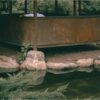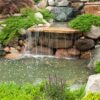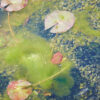How bad does the odor of your smelly pond water compare to rotten eggs in a basket? If you venture into your backyard, do your nostrils become melancholy? Is your family no longer going near the pond?
A smelly pond in a garden without fish is generally not a problem for the ecosystem. Having a nitrogen imbalance in a pond will impede its ability to remove harmful compounds and maintain the nitrogen cycle. Strong odors around ponds are typically a sign that there is a buildup or imbalance of waste materials. Those are both major problems for aquatic organisms.
A substance imbalance or buildup of waste is likely to be the cause of your pond water smelling badly. If your pond water smells bad, often like rotten eggs. It is likely due to a substance imbalance or buildup of waste. Usually, pond water smells in the Spring or early Summer when the weather conditions change and the water circulates naturally.
Winter months may bring unpleasant odors to the bottom of your pond. This odor will not manifest itself until spring when the pond’s level rises and the water mixes.
Pond Water and Odors: Common Causes and Solutions
Since water has no smell by nature. An out-of-balance pond won’t prevent you from holding your nose when you walk near it. In addition to these things, you may also experience pond stench as a result of a combination of these.
1. Stagnant Pond Water (lack of aeration)
Without aeration, ponds smell bad. A lack of movement causes the water to stagnate. Which leads to different temperatures accumulating in different layers of water, a process known as stratification. An aerator provides fresh oxygen and nutrients to the water in a pond. Which helps prevent substances from building up in one area. When pond water stagnates. It typically smells like rotten eggs and occurs during the spring after a change in weather. Temperature naturally causes the water to circulate. Despite the fact that oxygen reaches the top layers of the water. the bottom layers remain locked away until they are completely devoid of oxygen, which may take weeks, even months.
A pond smells due to bacteria that slowly decompose waste using enzymes at the bottom. Normal aerobic bacteria cannot flourish in stagnant ponds. Since their metabolism relies on large amounts of oxygen, which is rare in stagnant bodies of water. In anaerobic bacteria without oxygen, the pond waste slowly breaks down. Carbon dioxide and hydrogen sulfide produced by this process have harmful by-products that accumulate in the bottom of a pond. The bottom layers of water mix with the top layers of water when Spring arrives and climate changes occur. As a result it releases the harmful and stinky chemicals.
When these substances mix with upper layers of pond water in Spring, they can cause illness and death in fish. It is also hydrogen sulphide that makes rotten egg smells so infamous.

2. Inadequate water filtering
The pond will slowly become smelly as waste material accumulates without any means of filtering it. If your wildlife pond does not have a filter box, you will need natural filters, like pond plants, to remove excess nutrients from the water. During a period of building up waste (sludge) and excess water nutrients in a natural pond, plants and algae act as natural filtration systems.
The bioload of organic waste produced in a pond with fish requires a filter system and pond pump to function effectively. A faulty or failing filter leads to dangerous levels of organic matter and harmful chemicals and can cause unappealing odors. If you want a healthy fish pond, you must have a filter and pump that are the correct size and keep up with the maintenance.
3. Pond Muck
As you can imagine, the smell of muck isn’t pleasant, as it is a collection of organic waste from the pond. In shallow ponds, it can build up to the point where you smell swampy sewage odors.
Sludge at the bottom of a pond is normal, but if it gets too high, you may begin to smell something wrong on the surface. In a pond, sludge is the organic material that sinks to the bottom and starts to decompose. Ponds will all have some level of sludge which helps as a natural fertilizer for pond plants. In ponds surrounded by trees or plants that drop leaves, the sludge levels can steadily rise over time if there are a large number of fish producing wastes.
The smell of a pond that has sludge near the surface becomes noticeable, typically smelling of rotting plants and eggs. If a garden pond has small amounts of sludge, it shouldn’t cause problems. The sludge in your pond may also cause odors by being thick, black, and slowly building.
4. Algae overgrowth
Overgrowth of pond algae is another common cause of bad pond smells. Algae can’t cause any major changes in odour by themselves, but when a lot of algae die off, things change! Blooms of algae are usually quick to happen, and as soon as one algae begins to grow, another starts to die. A spike in algal decomposition can significantly threaten the ecosystem of a pond, as well as reducing oxygen needed by fish to survive. Because pond bacteria decompose organic waste by using oxygen, the oxygen in the pond quickly depletes as algae rapidly die off. Bacteria that can’t cope with decaying matter will begin to slowly accumulate harmful substances, which can lead to potent smells and bad water odor.
Smelly Pond Water: How to Fix & Prevent It (Fish Safe Treatments)
Aerate the Pond Extra (Oxygen)
In addition to causing pond smells, stagnant pond water can lead to other pond issues as well. To remain healthy, ponds of all types, whether they contain fish or not, require a stable amount of aeration and water flow. Oxygen is necessary for fish and bacteria, nutrients for plants, and movement is essential to prevent harmful substances from accumulating.
With waterfalls and fountains, or using a physical aeration system, aeration occurs naturally. If your pond is full with fish, we recommend you aerate as much as possible! Aerating your pond will improve its health, so provide as much oxygen and flow to the water as you can.
A solar fountain is a good alternative to an electric fountain, especially if your pond is smaller or gets plenty of sunlight. There are no expenses associated with these options for extra aeration and water movement. Smaller ponds-or ponds with fish-benefit from them, as well as larger ponds with aeration systems.
You should install a de-icer on the surface of your pond if it freezes over regularly in winter to allow gas exchange to take place and keep your fish alive.

Cleaning and optimizing filters & media
Without an effective filtration system, waste materials will accumulate in your pond over time. To maintain a healthy fish pond with goldfish or koi, a filtration system is needed. To prevent clogging, you should regularly clean the mechanical media of your filter system. If you’d like to improve the number of beneficial bacteria present in your biological media, you could also replace the standard variety with a more optimized selection. A good bacteria product will also contribute to reducing water odors since more bacteria will be able to break down wastes, such as ammonia, which can cause bad odors in the pond.
Unless you have a filter box and fish in your wildlife pond, you will need plenty of pond plants and preferably a fountain or waterfall. As plants absorb nutrients, the more the better! Without a filter unit, excess nutrients will be absorbed and cause odors. The beneficial bacteria present in natural ponds can also be added to give a fishless pond a boost in levels by supplementing with their products.
Reduce pond waste, muck, and sludge
There is an unpleasant smell similar to sewage when there are large quantities of sludge on the water’s surface (i.e., pond shelves). Pond sludge is normal, but large amounts should be removed to prevent a buildup of substances harmful to fish and causing bad smells in the water.
To clean a small garden pond and remove sludge, a basic pond net should suffice. The use of a pond vacuum and natural sludge breakdown products is the most effective solution for ponds with a greater area and deeper points. An elegant pond vacuum will be able to completely remove sludge in a fraction of the time it would require with a simple net. By adding bacteria and enzymes after vacuuming, you enable the bacteria in these products to break down the sludge as it builds up, and thus prevent it from returning as quickly.
We also recommend installing a pond net or skimmer box if you have a lot of fallen leaves in your pond to prevent sludge build up over time. Vacuuming regularly and manually removing the particles works, but it is often easier and more cost-effective to just prevent the problem from happening in the first place. You can use both skimmers and basic netting together to prevent a large amount of organic matter from sinking into your pond and contributing to sludge.

Controlling & removing algae blooms
Sludge is built up from algae, water is reduced in oxygen, and plants vie for nutrients from algae. When they decay in large quantities, they contribute to the odor of rotten eggs and sewage. If they get too large, they can also cause unwanted pond smells.
Algae blooms in ponds can be removed with a variety of methods, and the option you choose depends on the type of algae and whether you have fish in the pond. By using a UV clarifier in your pond circuit, you can safely and effectively control free-swimming (green) algae. Your filter system can effectively remove floating algae that gets clumped together due to the UV lights that a clarifier uses. Our recommended method of algae removal and control for pond fish is to use a UV clarifier to treat the water and remove the green color. String algae, for example, can not be sucked into a clarifier unit, so they must be manually removed with a net or pond vacuum.
The detailed guide to algae removal and control can be found here. If you follow some of these steps, however, make sure to read every step carefully, as not every method is safe.










